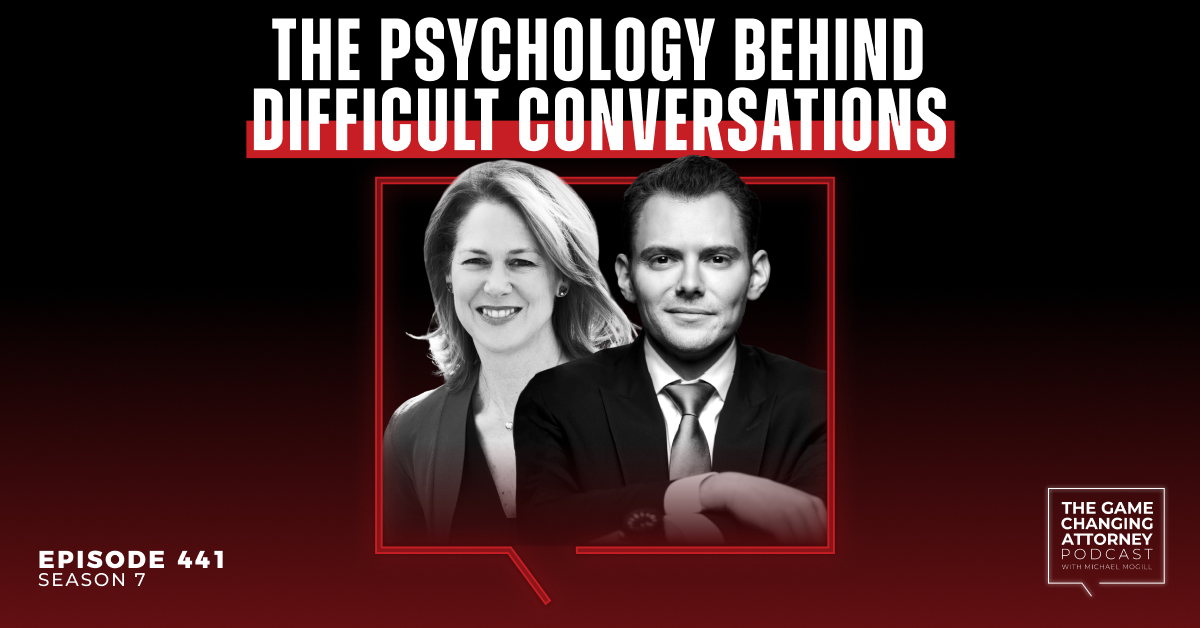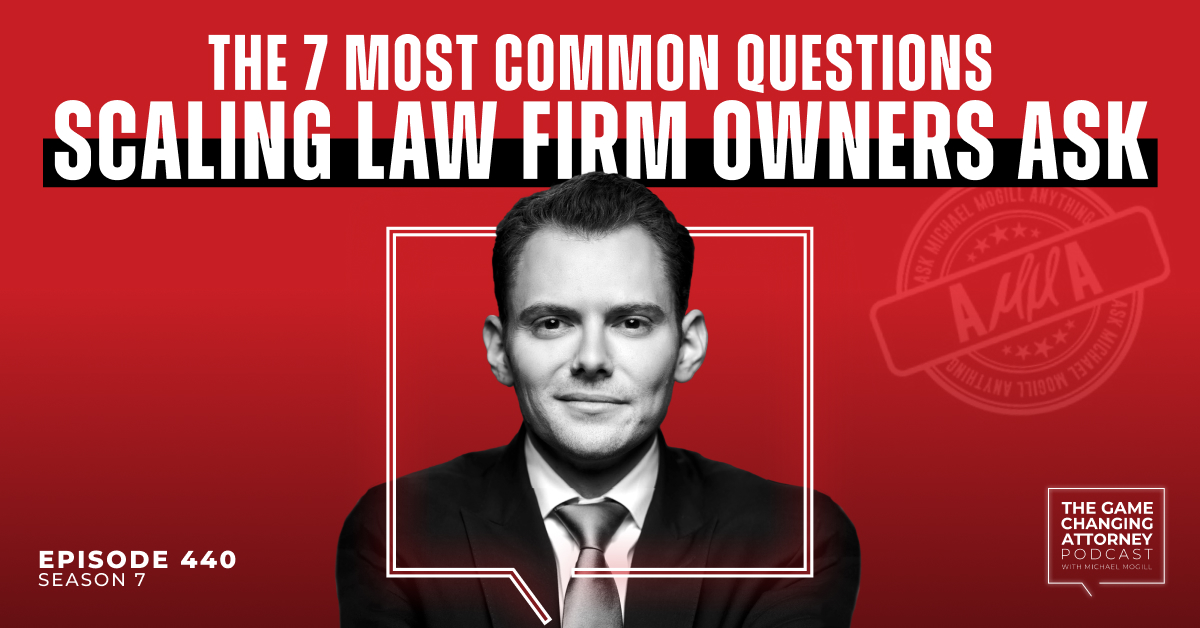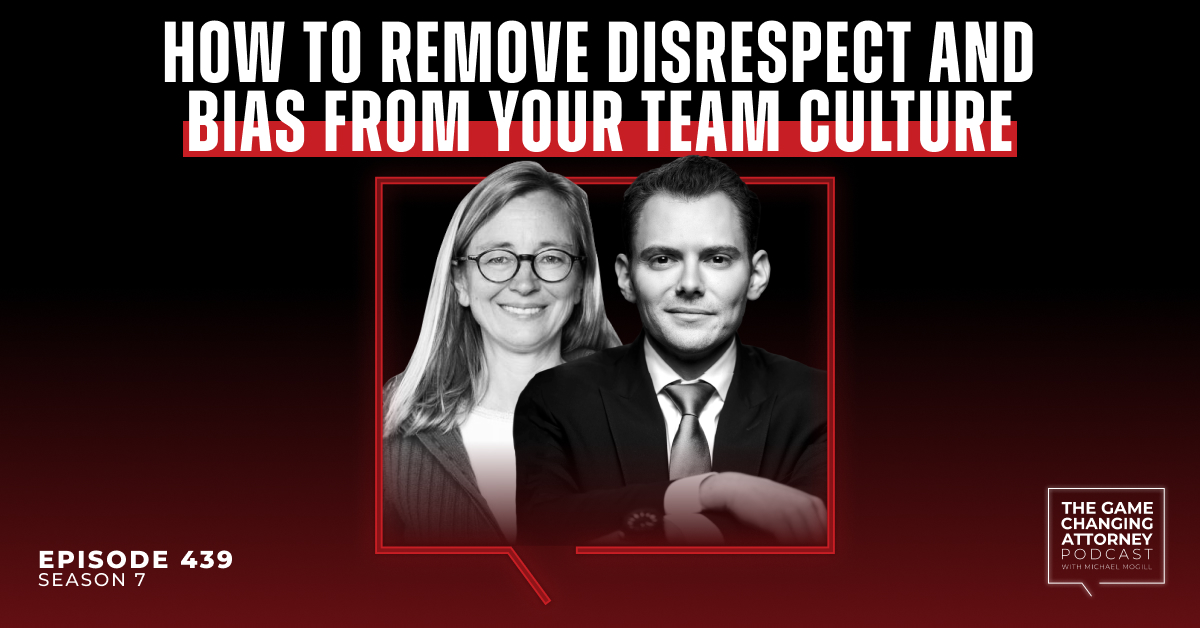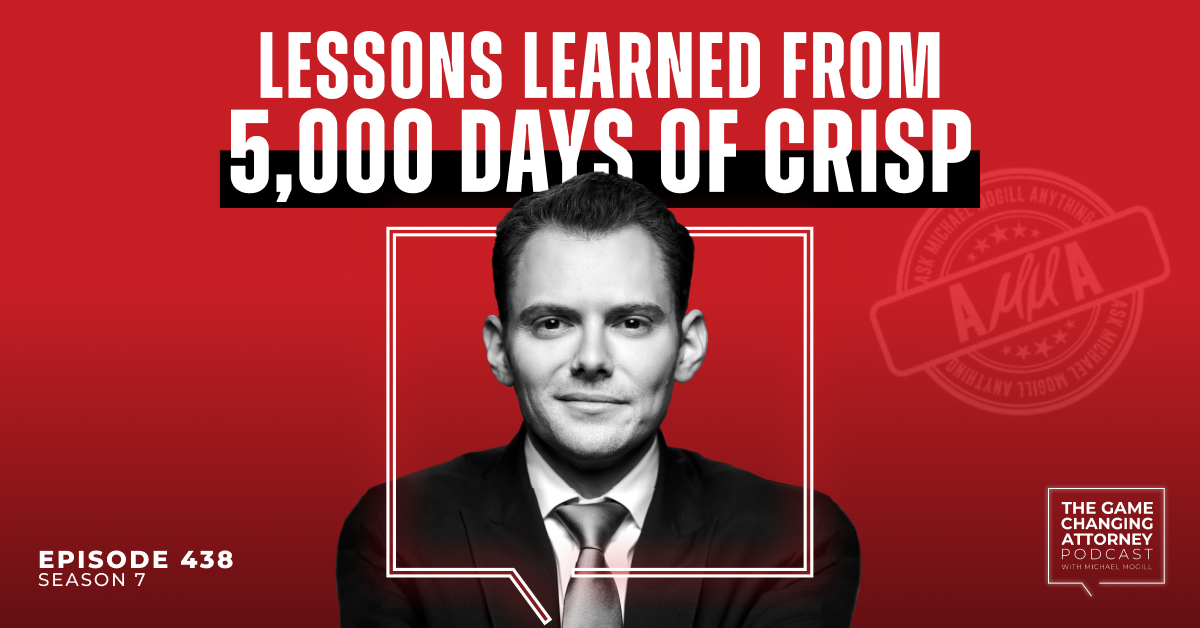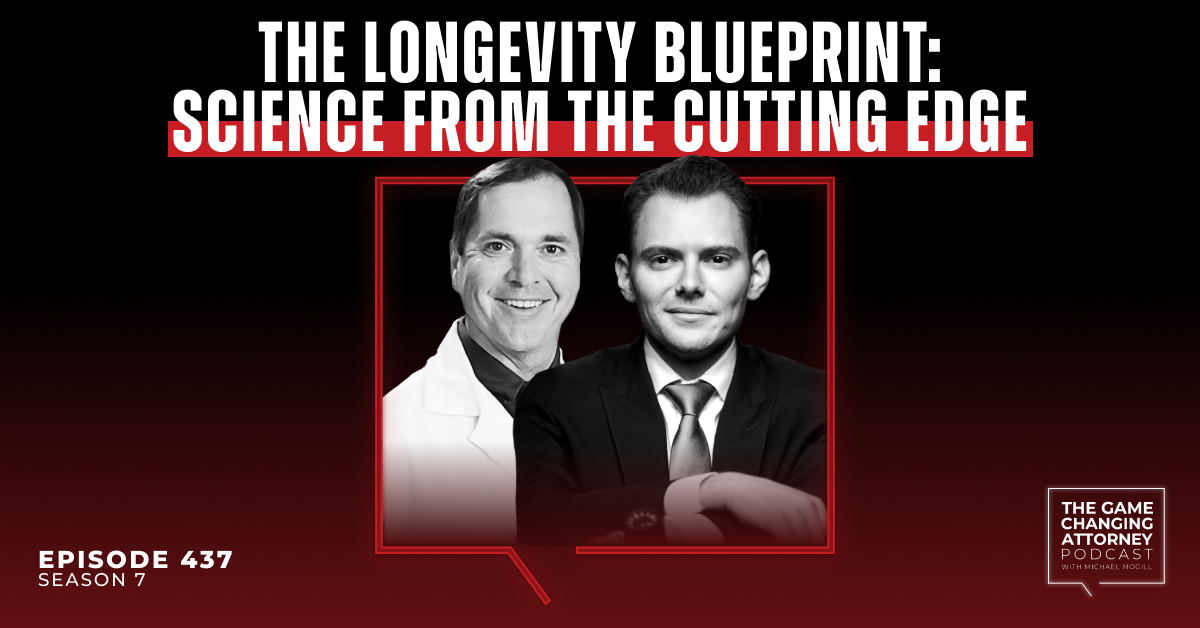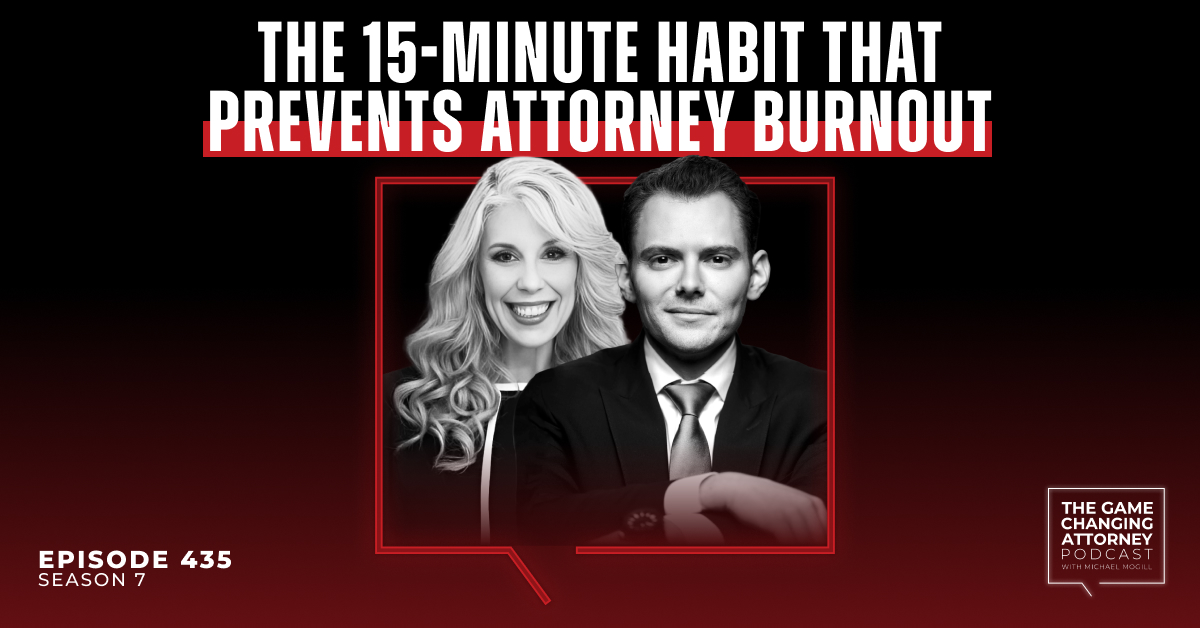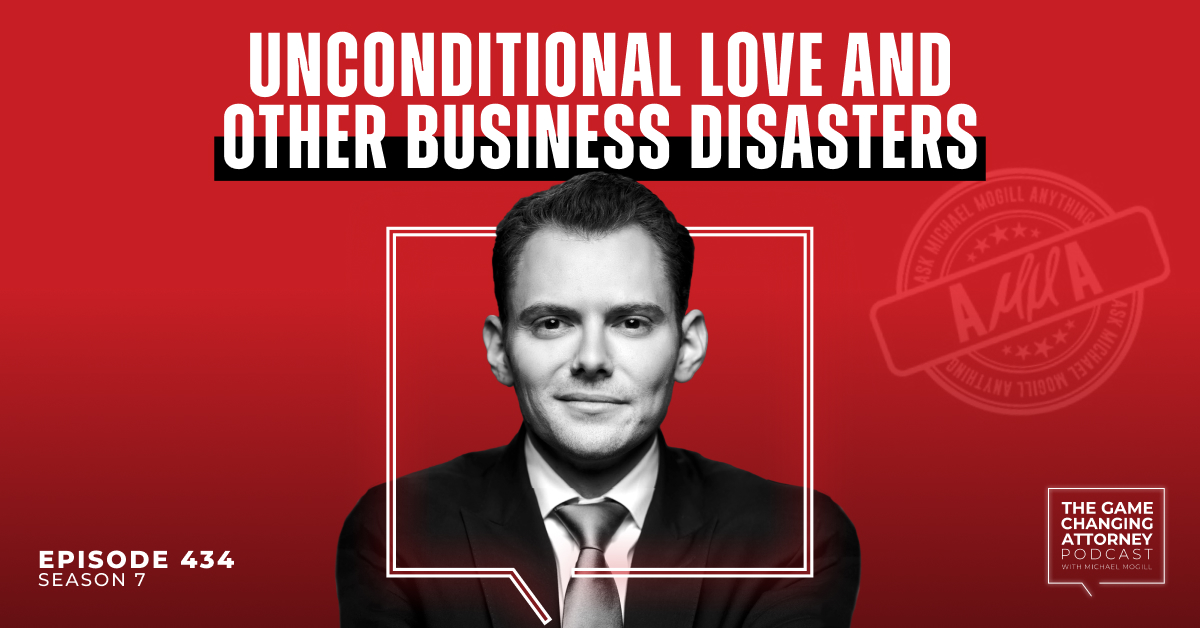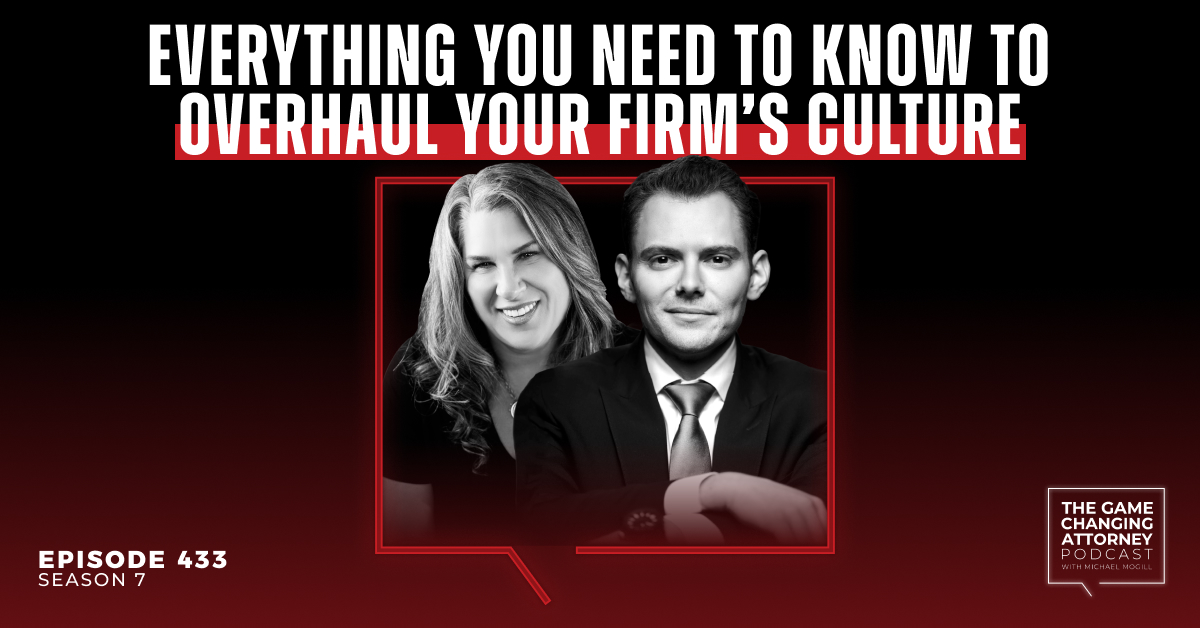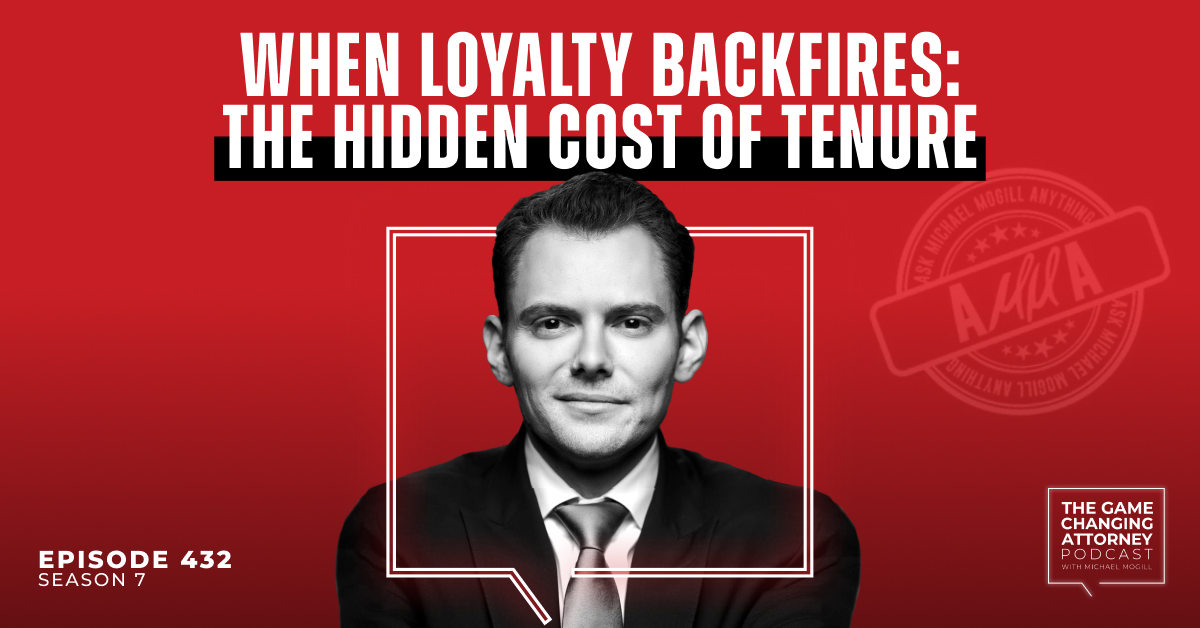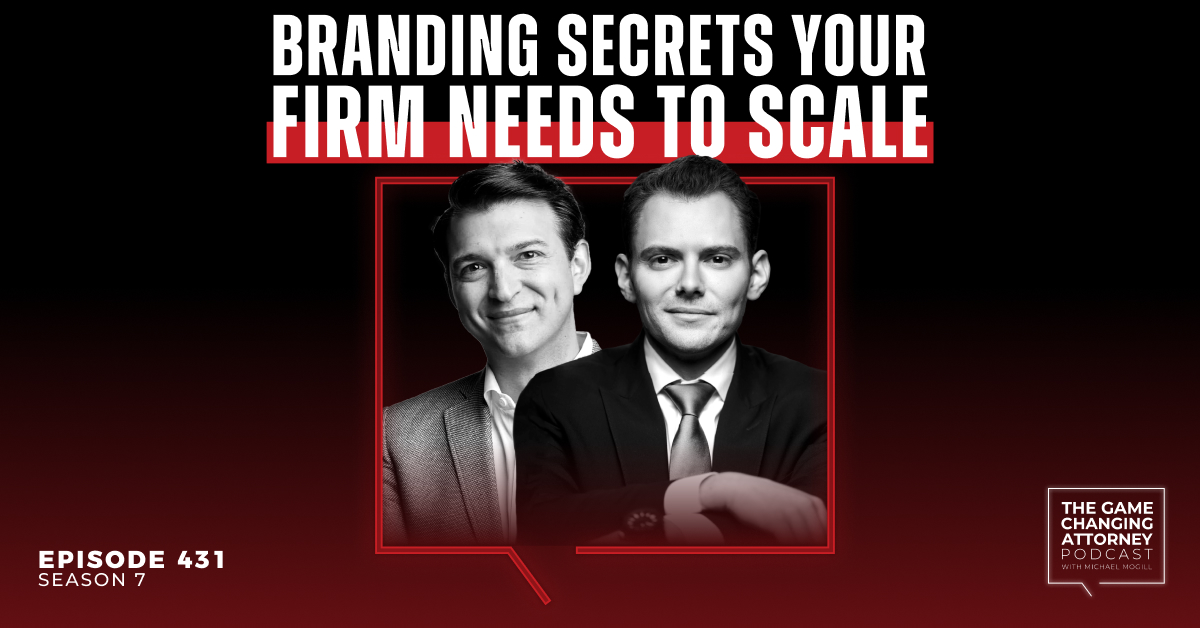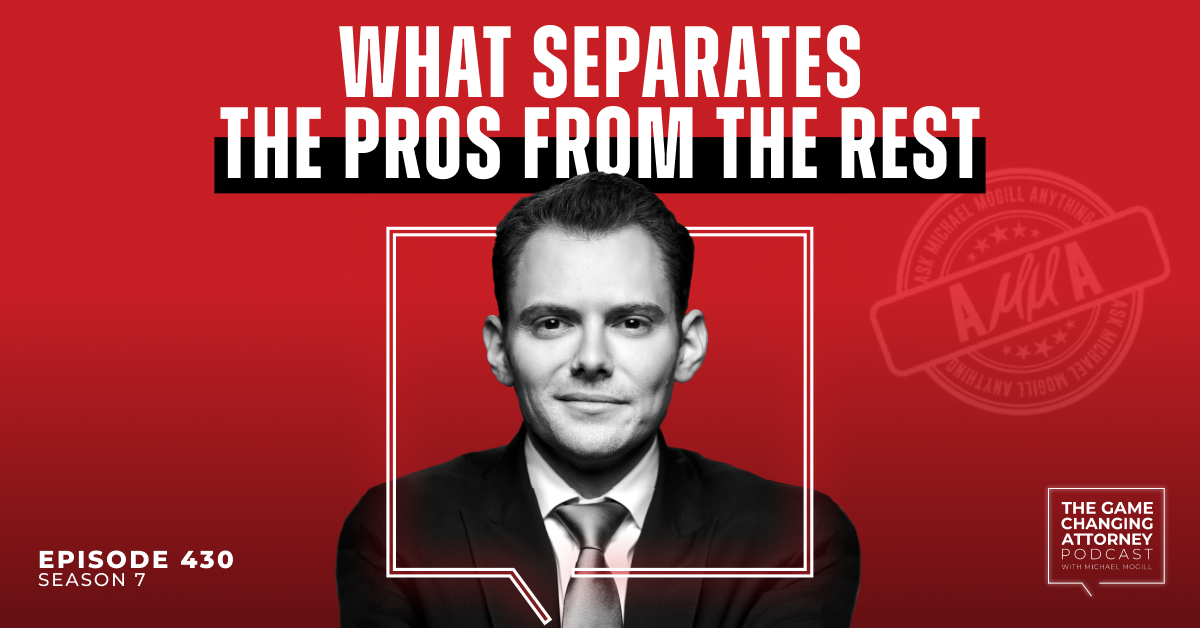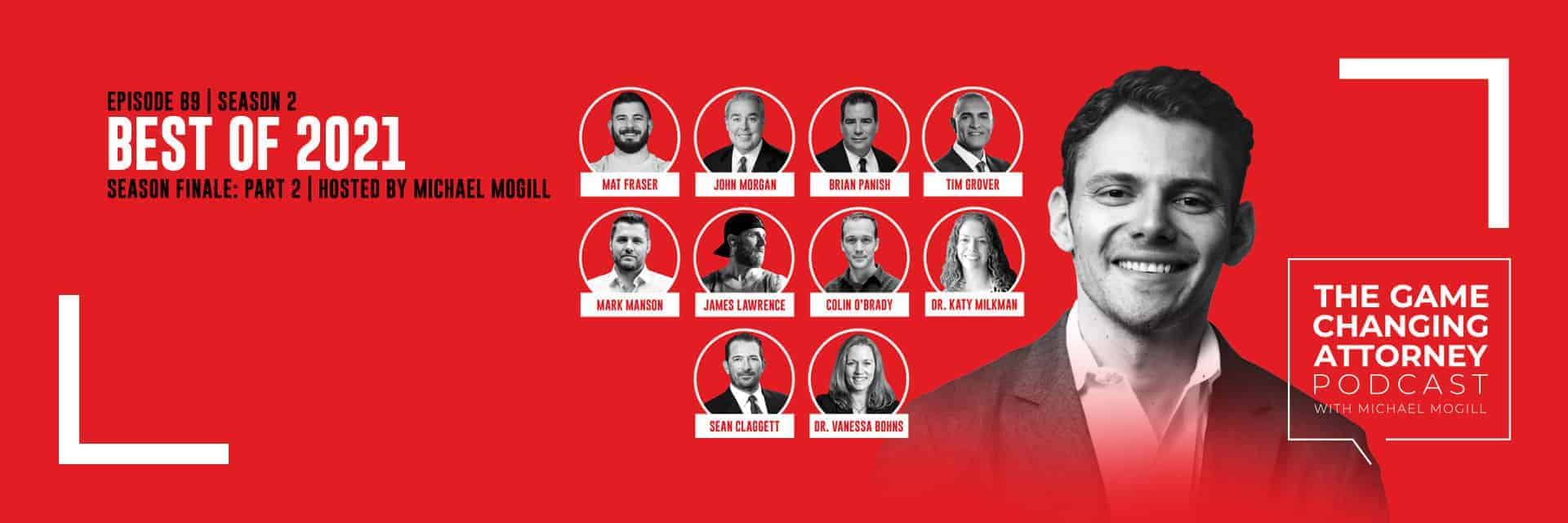
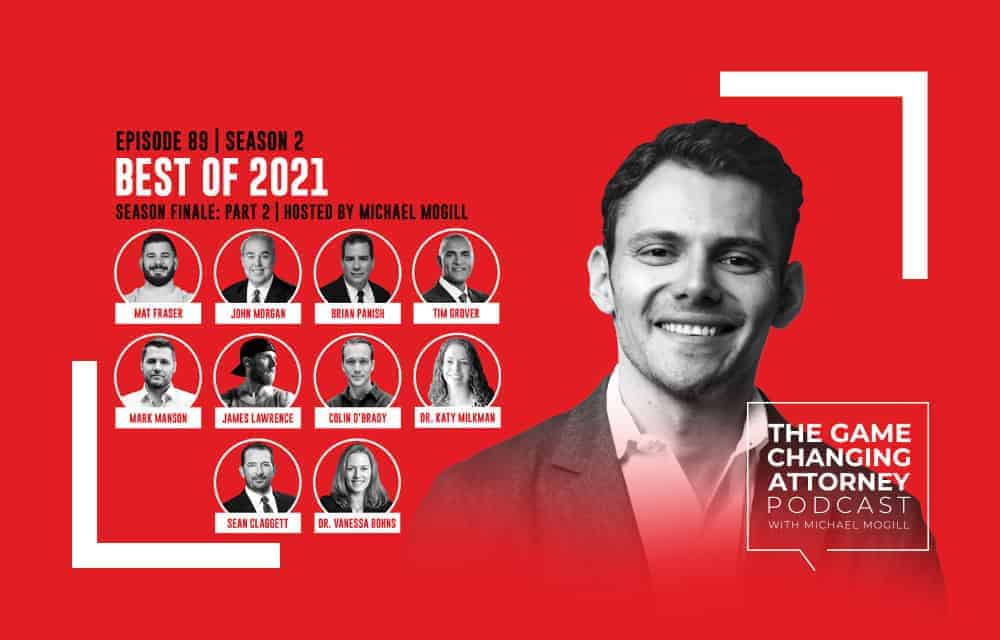
Episode 89 — Season 2 Finale: Part 2
The time has come for Part 2 of the final episode of Season 2 of The Game Changing Attorney Podcast! Let’s take a look back at some of the most memorable and supercharged guests, from inspiring athletes to legendary law firm owners, this season did not disappoint.
In this episode, look forward to the stories, advice, and thoughts from the following game changers:
- Mat Fraser — 5x CrossFit Games Champion
- John Morgan — Founder of Morgan & Morgan
- Brian Panish — Trial Attorney and Partner at Panish Shea & Boyle
- Tim Grover — Performance Coach and Best-Selling Author
- Mark Manson — New York Times Best-Selling Author
- James Lawrence — The Iron Cowboy
- Colin O’Brady — 10x World Record Holding Explorer and Best-Selling Author
- Dr. Katy Milkman — Professor, Behavioral Scientist, and Best-Selling Author
- Sean Claggett — Trial Attorney and Partner at Claggett & Sykes
- Dr. Vanessa Bohns — Cornell Professor and Author
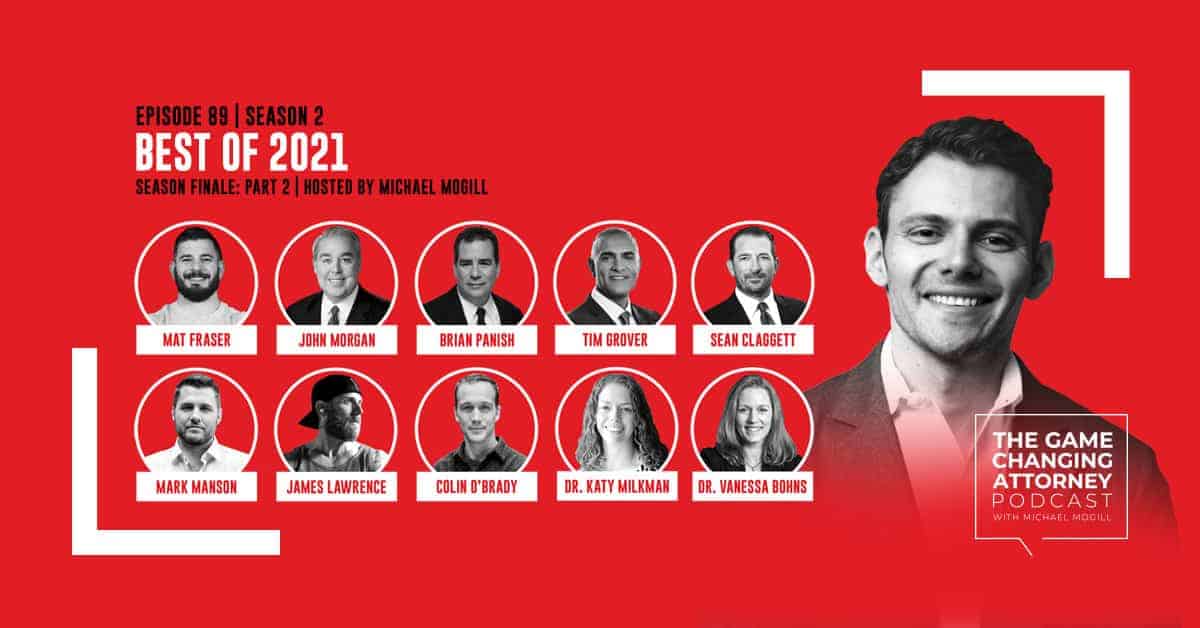
Listen & Subscribe
Show Notes:
8:02 – Living low paid off. [Mat Fraser] “I set up my life so that there was as little risk as possible. I lived in my parent’s basement as long as possible so I didn’t have bills. I drove an old, old beat up car that I bought for $300 so that I didn’t have a car payment. I was able to afford to live this lifestyle with this huge, huge risk with no pressure. If I go to a competition and fail, I’m not letting down my family, not losing my house or my car. I tried to live as close to zero expenses as possible so I could afford to take this risk.”
11:52 – Baby does well in a corner. [Mat Fraser] “It’s a very freeing feeling, having your back against a wall, because you’re already failing. You can’t get worse, so just swing for the fences.”
14:08 – Passion creates success. [Mat Fraser] “It doesn’t matter how much better you are than me at this. The amount of passion that I have behind this — there’s no skill level that can trump it. I am willing to go to lengths and depths that I know you aren’t willing to touch.”
15:42 – Motivating factors. [Mat Fraser] “I want to have a cool f****** story when I’m old…I also want a life that I want to live, not a life that I have to live.”
18:35 – An unlikely success story. [John Morgan] “I’ve always been fascinated with paperboys. They’re 10 or 11 years old, and they’re tied to this job every day. Rain, sleet, snow, grouchy customers, bad customers — they do it every single day. I believe those paperboys are lions. Warren Buffett was a paperboy. Oprah Winfrey was a papergirl. When I meet people, especially my age, I ask them if they were a paperboy or a papergirl. And when they tell me they were, it’s like my own little Meyers Briggs personality test. I know who I’m dealing with.”
20:13 – Don’t rule mules out. [John Morgan] “Some mules can plow all day long, and some mules don’t do anything. The secret to success is not brains; it’s the willingness to work. Everybody that I know who is very successful has been a hard worker. When I look around my firm or around the offices in America, the most successful people are the people working on the weekends. The common denominator: the most successful people in my life have been the hardest working.”
22:09 – The secret ingredient. [John Morgan] “Almost everybody has a limit of satiability. But then there’s that rare breed that has an insatiable appetite. No matter what they have, they want more. It’s not about money. It’s about winning. It’s about succeeding. It’s about being respected. I’m always looking for those people who have that insatiable appetite. That they’re never going to stop because they want to be successful, respected, and revered.”
29:23 – Salmon have the right idea. [John Morgan] “There’s always resistance. There’s always somebody trying to stop you. Anything that’s worthwhile will not be easy. Sam Walton had a rule: swim upstream. When people tell you that you can’t, that just means that they can’t. When people say no, it really means yes. You have to make sure that you understand that a lot of people are trying to stop you from being great because they know that they can’t be great. And misery loves company.”
33:55 – What it means to win. [Brian Panish] “Winning isn’t a marathon; it’s a sprint that never ends. It’s more the mindset of how you go about it, what you do to perfect it, and how you carry it out every day.”
37:08 – It begins from within. [Brian Panish] “The most important thing in a law firm is its culture. If you have people who are committed to the firm’s goals, then you’ve got a strong culture. But if you have people who are complaining and saying negative things, then it starts going around the firm — unless you have strong leadership and a consistent culture. That culture defines who you are and what you want to be. For us, our culture is getting the best results for the clients and doing the best work. We’re going to continue to do a great job and build our brand and our reputation and continue to get better. And if you do that, you’re going to be successful. But if people don’t want to work, then I’m the first to tell them that they can go ahead and leave.”
38:58 – Stick to the script. [Brian Panish] “Lawyers need to be dedicated to the practice and the clients, and they’ve got to know about the cases. They’ve got to work hard, but they need to know that it’s not about them. It’s always about the client; it’s not about them getting a big verdict or getting in the headlines. It’s about doing the right thing for the client. If you keep that in mind, you’ll always be right. It’s when you stray from that and try to get a bigger verdict or go out to the media. Sometimes people are too into themselves.”
41:51 – You are your biggest competition. [Brian Panish] “One time I was fishing with my dad and these guys across from us were catching all kinds of fish. I was getting frustrated that they were beating us, but my dad said, ‘In life, you need to compete with yourself, not others.’ We see what other firms are doing and I have respect for them, but we try not to focus on them as we run our own practice.”
45:30 – The journey is always what matters. [Tim Grover] “Winning isn’t about the parade, the streamers, or the confetti. It’s about the road that you take, the amount of time you spend to capture that win, and how quickly that win can be taken away from you. We think that once you become a winner, you will be a winner forever, but no one understands that most people are afraid to win.”
47:26 – A winning mindset. [Tim Grover] “If you have the mentality of a winner and you can actually execute it, you separate yourself from the pack. Once people start to pull away from the pack and realize how little protection or support they have and how much it’s really on them, they realize how much pressure comes with it.”
50:43 – Looking for an easy way out. [Tim Grover] “There are no easy steps. We’re trying to make everything easy, even working out of ‘the comfort and ease of your own home.’ But if workouts are comfortable and easy, then it’s not a workout — but that’s what sells.”
53:48 – Winning means making sacrifices. [Tim Grover] “For my work, I travel constantly. My clients require me to be in certain places, and it’s a commitment I made to them, myself, and winning. One night I was packing, and my daughter walked in. She asked me why I travel so much. I told her this is how I provide for my family and how I put food on the table. Then she asked if she ate less, would I stay home more? If this had been a Hollywood ending, I would have unpacked my bags and we would have gone out for ice cream. But I kept packing. Those are the decisions that winning requires you to make. Anybody can make the easy ones, and that’s why everyone doesn’t win.”
59:28 – What struggles really matter? [Mark Manson] “What ‘not giving a f*ck’ is, or essentially the question of, ‘What do you give a f*ck about?’ is a question of values and priorities. I strongly believe that the core question of our day and age is, ‘What is worth caring about?’ or, ‘What is worth focusing on?’ We live in an age where we are constantly overwhelmed with information and opportunity, and so the biggest struggle for most of us is to figure out where to delegate our limited time and attention. What is worth focusing on? What is worth caring about? It’s a really, really hard thing to figure out. I think five years ago, when the book came out, people were very unaware that struggle was going on within themselves. I think today people are generally aware that it is a struggle, but as a culture we still haven’t really figured out how to tackle it.”
1:04:24 – The detriment of material things. [Mark Manson] “Whether you are abundant in something or lacking in something, it’s that attachment to that thing that is causing you to suffer — not the thing itself. I kind of modernize that in the book by framing it in terms of happiness. If you think that you’re going to get rid of all your problems and that’s going to make you happy — trying to get rid of all your problems is itself a problem. Getting rid of your problems and keeping your life so that it has no problems is itself a problem. Any solution to a problem merely presents a new problem, so there’s this endless stream of problems in life. Our problem is not that we have problems. It’s that we think that we shouldn’t have them, or that our expectation is that it’s possible to live without problems. The chapter’s very much just a call to find problems you enjoy having. That’s essentially what happiness is: finding the struggle that enlivens you, makes you excited to get up in the morning, and feels meaningful. Because you’re never going to get away from struggle. You’re never going to get away from attachment. You’re never going to get away from problems. So you might as well find the ones that feel as though they’re worth suffering for.”
1:06:08 – Standing out from the crowd. [Mark Manson] “We all want the same stuff. We all want a nice house and a cool car and a great relationship and tons of sex and money and fun and a great family. We all want the same sh*t. There’s nothing particularly interesting or unique about that. The thing that makes us who we are is what we’re actually willing to sacrifice and what we enjoy sacrificing.”
1:7:55 – Playing it a little too safe. [Mark Manson] “By making modern life so safe, comfortable, and emotionally insulated, we remove our ability to find meaning. If you think about the most meaningful moments in your life and what you’re most proud of, there’s not a single one that didn’t require some degree of struggle or sacrifice. It’s a 1:1 relationship. When things are given to you without any sort of sacrifice, you take it for granted and don’t appreciate it. It’s the things you struggle incredibly hard for that end up giving you the most meaning in life.”
1:14:40 – The benefits of short term memory. [James Lawrence] “We’re blessed with short-term memory. We tend to forget how bad the bad was and only remember the good moments, the successes, and the victories. That’s a great way to be wired, because eventually we’ll do something bigger and harder. If we knew how difficult a challenge was going to be and we only remember the hard times, we would never push our limits.”
1:15:22 – Being great takes time. [James Lawrence] “You don’t just wake up and go, ‘You know what? 100 Ironmans in 100 days? Let’s go.’ Because you will fail. I promise you that. You have to methodically attack it with intent to achieve the goal, and you need to gain momentum. You’ve got to start chalking up little tiny wins along the way. If not, you’re going to fail, and then you’re going to associate failure with you, which isn’t who you are. We’re all winners at our core, but if you go too big too quick, I promise you will fail. And then you’re going to be labeled that and it’s going to be harder and harder to get off the ground doing successful things.”
1:19:45 – Trust the process. [James Lawrence] “The biggest reason people fail, especially with big goals, is because they don’t respect the time frame involved in order to have that change or that impact. Make a commitment, take accountability, show up, and do the work.”
1:27:11 – Our untapped potential. [Colin O’Brady] “All of us — every person listening — we all have untapped reservoirs of potential to achieve extraordinary things, particularly when we can shift our mindset toward the positive and choose how to react in tough situations.”
1:30:04 – Humans thrive on obstacles. [Colin O’Brady] “Too often, we’re stuck in this zone of comfortable complacency. So rather than thinking about one to 10 in a linear plane, I think about it as a pendulum swinging back and forth. I’ve realized to experience the 10s, you also need to embrace the ones. You need to put yourself in challenging circumstances.”
1:37:05 – The joys of storytelling. [Colin O’Brady] “I love storytelling. I think that every single person has a beautiful story to tell, and as humans, we gain inspiration from other people’s stories. I love sharing my story for that reason, but I love consuming others as well. When we share stories, there’s a ripple effect of positivity that happens from being inspired and lifted up by a community of folks who share them.”
1:39:50 – Look for opportune moments. [Dr. Katy Milkman] “At moments that feel like new beginnings, people are more likely to start pursuing educational, financial, and health goals. Looking for these moments that act as propellants — they supercharge our motivation and allow us to jump into action. When you’re in a coaching position, searching for these moments can be really valuable for the people you’re coaching.”
1:44:53 – Practice really does make perfect. [Dr. Katy Milkman] “It really is true that the more you practice something, the more it becomes habitual. We think about deliberate practice as something you do to achieve mastery, which is absolutely true. It turns out that building habits is also about repetition. If there’s something you want to do that’s good for you in the long run, try to think of it as something you want to practice just like you’d practice the piano.”
1:46:57 – Supportive friends are the best friends. [Dr. Katy Milkman] “There’s a huge influence that social forces play on our ability to achieve our goals. The people who we surround ourselves with show us what’s possible. They give us hints as to what we can do to achieve similar objectives in life. To the extent that you can craft a community of like-minded individuals and build groups that you intentionally socialize with who have similar goals and aspirations is really, really valuable.”
1:50:44 – Lead by example. [Sean Claggett] “You lead by doing what needs to be done. People look at your work ethic. If you’re the partner in your firm who’s basically packed it in and shows up 20 hours a week, do you really think your staff works hard? You’re the example as the leader. I’m almost always the last person to leave, and a good short day is 12 hours. When people see that, they understand that what we do takes time. If you want to be great at it, then you need to spend time being great at it.”
1:53:59 – Think before you speak. [Sean Claggett] “There are individuals who have a natural charisma and people are drawn to them and want to be around them. But you can’t have just that in order to be a great trial lawyer. You need to be extremely detail-oriented to the facts of your case, because if you lie or misrepresent one time, you’re done. The jury will hold it against you. A lot of the time it’s lack of preparation that creates the appearance of dishonesty and lack of being trustworthy because you say something that you don’t know for a fact to be true.”
1:56:55 – Become a hot commodity. [Sean Claggett] “As a lawyer, you are a commodity. Don’t kid yourself. You can invest in yourself as a commodity or not. 95 percent of lawyers get their licenses and then take CLEs that aren’t meaningful and don’t improve themselves. They get 10 years in and find they’re only slightly better than they were going into it 10 years ago. When you invest in yourself as a commodity, you start to become a great lawyer.”
2:01:10 – People notice more than you think. [Dr. Vanessa Bohns] “The invisibility cloak illusion refers to the idea that as we walk through the world on an ordinary day, we think that no one is paying attention to us. We think we’re essentially walking around in an invisibility cloak. What Emily Boothby at Wharton showed is that people are noticing you and the things you’re doing, wearing, and your behaviors more than we tend to think.”
2:06:41 – The perils of having power. [Dr. Vanessa Bohns] “People in positions of power feel like they don’t have to worry so much about what people think, and they generally don’t feel the same constraints. What happens then is they extend that to their impressions of other people. They forget that not everyone is lacking in those constraints.”
2:09:40 – The difference in people. [Dr. Vanessa Bohns] “One big worry of power is that people are so focused on enriching themselves and maintaining their own power that they aren’t thinking about the people they’re in charge of. There’s a difference in the research between people who think about power in terms of opportunity, and people who think about the responsibility that comes with power.”
EPISODE RESOURCES & REFERENCES:
CrossFit
Morgan & Morgan
Shaquille O’Neal
Walt Disney
Disney World
Roy Disney
Pluto
Winning: The Unforgiving Race to Greatness by Tim Grover and Shari Wenk
Tim Grover
Relentless: From Good to Great to Unstoppable by Tim Grover
Michael Jordan
Wayne Gretzky
Derek Jeter
The Subtle Art of Not Giving a F*ck by Mark Manson
Abraham Lincoln
Theodore Roosevelt
Buddha
Buddhism
The Iron Cowboy Website
The Impossible First
How to Change by Katy Milkman
Weight Watchers
Alcoholics Anonymous
Claggett and Sykes Law Firm
You Have More Influence Than You Think: How We Underestimate Our Power of Persuasion, and Why It Matters by Dr. Vanessa Bohns
Connect with Michael
- Text directly at 404-531-7691
